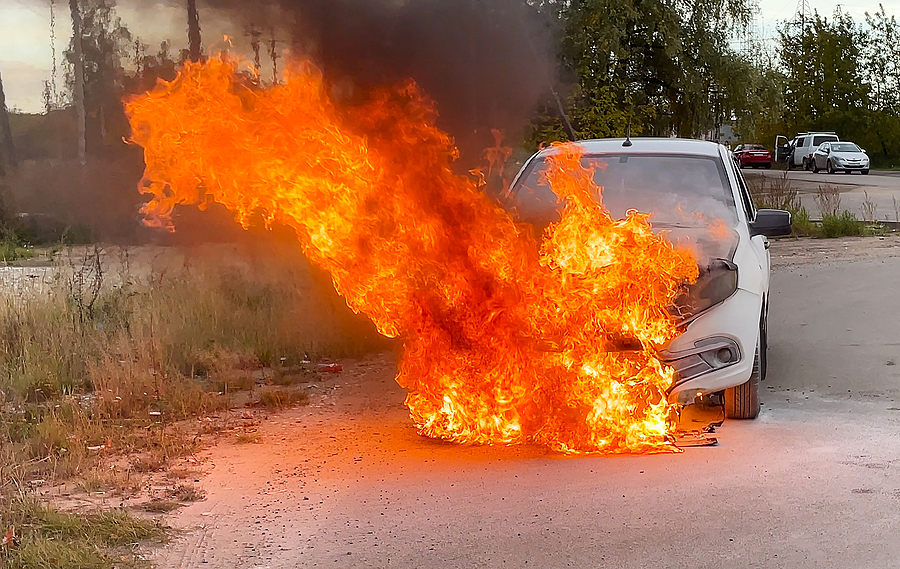Fire damage to your vehicle is devastating enough, but discovering you have no insurance coverage makes the situation even more challenging. Without insurance to cover the loss, you’re left wondering how to dispose of your fire-damaged car and whether you can recover any value from what remains.
The good news is that even severely fire-damaged vehicles have options for disposal, and you might be surprised to learn that some value can still be recovered. Understanding your choices—from selling to auto salvage yards to donating for tax benefits—can help you make the best decision for your specific situation.
This guide will walk you through the essential steps for legally and profitably disposing of your uninsured, fire-damaged vehicle while avoiding common scams and ensuring proper documentation.

Assess the Fire Damage and Determine Your Car’s Value
Before exploring disposal options, you need to understand what you’re working with. Fire damage varies significantly, from minor cosmetic issues to complete structural destruction.
Start by documenting the damage with photographs from multiple angles. This documentation serves two purposes: it helps you communicate the vehicle’s condition to potential buyers and provides records for your personal files.
Consider these factors when assessing damage:
- Engine and mechanical components: Fire under the hood often destroys the most valuable parts
- Interior damage: Melted plastic, burned upholstery, and smoke damage throughout the cabin
- Body and frame integrity: Severe fires can compromise structural safety
- Electrical systems: Fire typically destroys wiring, computers, and electronic components
Even heavily damaged vehicles retain scrap metal value. The actual cash value (ACV) of your fire-damaged car depends on current scrap metal prices, which fluctuate based on market conditions. A typical passenger vehicle contains 2,000 to 3,000 pounds of steel and other metals, providing baseline value regardless of the fire damage.
Understanding Legal Requirements for Vehicle Disposal
Proper disposal of your fire-damaged vehicle involves more than just finding a buyer. Legal requirements protect you from future liability and ensure environmental compliance.
In Indianapolis, specific regulations govern vehicle disposal. You must transfer the title to the junkyard or recycling center at the time of sale. Additionally, you’re required to notify the Indiana Bureau of Motor Vehicles (BMV) of the sale or disposal to avoid continued liability for the vehicle.
Failure to complete proper paperwork can result in ongoing responsibility for the vehicle, including potential citations, environmental violations, or accidents involving the car after you’ve disposed of it.
Exploring Your Disposal Options
Selling to Auto Salvage Yards
Junk car buyers and auto salvage yards represent the most straightforward option for fire-damaged vehicles. These businesses specialize in purchasing vehicles regardless of condition, focusing primarily on scrap metal value and any salvageable parts.
When researching junk car removal services, start with local options. In Indianapolis, businesses like Benjamin’s Junk Cars offer competitive pricing and handle the paperwork requirements. Local salvage yards like Benjamin’s often provide free junk car towing, eliminating transportation costs.
The process typically involves:
- Obtaining quotes from multiple salvage yards
- Scheduling pickup or drop-off
- Completing title transfer and bill of sale
- Receiving payment upon vehicle transfer
Expect payment based on the vehicle’s weight and current scrap metal prices. While fire-damaged cars won’t bring premium prices, you can still recover several hundred dollars depending on the vehicle’s size and metal content.
Selling Individual Parts
If your fire-damaged vehicle has salvageable components, parting it out might generate more revenue than selling to a salvage yard. This option requires more time and effort but can be worthwhile for vehicles with valuable undamaged parts.
Focus on components typically unaffected by fire:
- Wheels and tires (if not heat-damaged)
- Transmission and drivetrain components
- Catalytic converter (valuable for precious metals)
- Airbags and safety systems (if undamaged)
- Glass and mirrors
Online marketplaces, auto parts stores, and local mechanics represent potential customers for salvageable parts. However, this approach requires proper tools, storage space, and knowledge of automotive systems.
Donating Your Fire-Damaged Vehicle
Vehicle donation offers an alternative that provides tax benefits while supporting charitable organizations. Many charities accept fire-damaged vehicles, as they typically sell donated cars to salvage yards and use the proceeds for their programs.
Potential benefits include:
- Tax deduction based on the charity’s sale price
- Free towing and pickup services
- Simple paperwork process
- Supporting worthy causes
Research charities carefully to ensure legitimacy and maximum benefit. The IRS requires specific documentation for vehicle donations, and the deduction amount depends on how the charity uses or sells the vehicle.
Professional Recycling Services
Environmentally responsible disposal through certified automotive recycling centers ensures proper handling of hazardous materials while recovering maximum value from recyclable components.
Professional auto recyclers drain fluids, remove hazardous materials, and separate metals for recycling. This process meets environmental regulations and often provides competitive pricing compared to traditional salvage yards.
Recycling benefits include:
- Environmentally responsible disposal
- Competitive pricing for scrap materials
- Proper handling of hazardous substances
- Documentation of legal disposal
Get a Free Offer For Your Fire-Damaged Car 🧯✨
Essential Paperwork and Documentation
Proper documentation protects you from future liability and ensures legal compliance. Never dispose of your fire-damaged vehicle without completing necessary paperwork.
Required documents typically include:
- Vehicle title: Must be signed over to the buyer or recycling center
- Bill of sale: Documents the transaction terms and transfer of ownership
- BMV notification: Indiana requires notification of vehicle disposal
- Damage documentation: Photos and descriptions of fire damage
Keep copies of all paperwork for your records. Some situations may require additional documentation, such as insurance company correspondence or fire department reports.
Missing or incomplete paperwork can result in continued liability for the vehicle, including registration fees, violations, or accidents occurring after disposal.
Avoiding Common Scams in Junk Car Sales
Unfortunately, desperate sellers of damaged vehicles often become targets for scams. Understanding common schemes helps protect you during the disposal process.
Title washing involves dishonest buyers altering titles to hide fire damage, potentially creating legal problems for sellers. Only work with licensed, reputable businesses that provide proper documentation.
Lowball offers prey on sellers who don’t understand their vehicle’s scrap value. Always obtain multiple quotes to ensure fair pricing. Even fire-damaged vehicles have measurable scrap metal value based on weight and current market prices.
Fake payment schemes use counterfeit checks or money orders that appear legitimate but bounce after you’ve transferred the vehicle. Insist on cash payment or verified cashier’s checks from established financial institutions.
Hidden fees may be added after agreeing on a price, such as unexpected towing charges or “disposal fees.” Clarify all costs upfront and get agreements in writing.
No paperwork situations leave sellers liable for the vehicle indefinitely. Legitimate buyers always complete proper title transfers and provide documentation.
In Summary
Maximizing recovery from your fire-damaged vehicle requires strategic approach and patience. Start by obtaining multiple quotes from different types of buyers—salvage yards, scrap dealers, and recycling centers often offer varying prices.
Before finalizing any sale, remove all personal items from the vehicle. Check glove compartments, center consoles, door pockets, and the trunk thoroughly. Items left behind are typically considered abandoned property.
Time your sale strategically when possible. Scrap metal prices fluctuate based on market conditions, and higher prices translate to better offers for your damaged vehicle.
Research buyers carefully by checking online reviews, Better Business Bureau ratings, and state licensing information. Reputable junk car buyers provide transparent pricing and proper documentation without pressure tactics.
Making the Right Choice for Your Situation
The best disposal option depends on your specific circumstances, including the extent of fire damage, your available time, and financial goals. Severely damaged vehicles with minimal salvageable parts are ideal candidates for salvage yard sales, offering quick, hassle-free disposal with guaranteed payment.
Vehicles with valuable undamaged components might justify the effort of parting out, especially if you have mechanical knowledge and storage space. However, this approach requires significant time investment and market knowledge.
Donation works well when tax benefits outweigh potential cash recovery, particularly for vehicles with limited scrap value or when supporting specific charitable causes matters to you.
Professional recycling provides the best balance of environmental responsibility and competitive pricing, especially important for vehicles with significant fluid contamination from fire suppression efforts.
Whatever option you choose, prioritize proper documentation and work only with licensed, reputable businesses. The small amount of extra effort required for due diligence protects you from significant future problems.
Remember that even fire-damaged vehicles retain value, and multiple options exist for recovery. Don’t accept the first offer without exploring alternatives, and never dispose of your vehicle without completing proper paperwork.
If you need assistance with professional junk car removal services that handle all paperwork requirements and provide competitive pricing for fire-damaged vehicles in Indianapolis, contact Benjamin’s Junk Cars today for a free quote and hassle-free disposal solution.
Book Free Junk Car Removal Now
Related Post: What To Do if You Just Totaled an Uninsured Car
